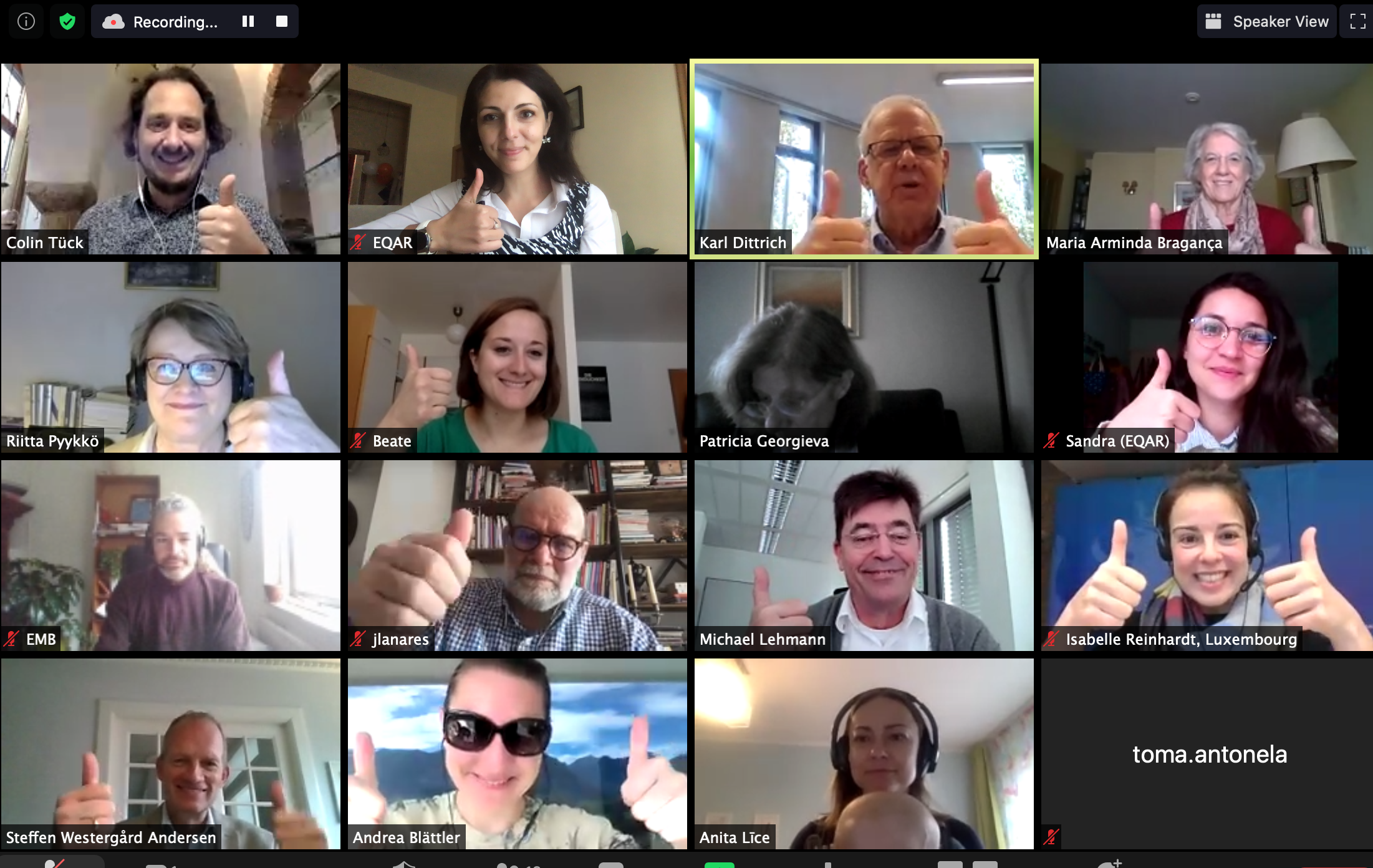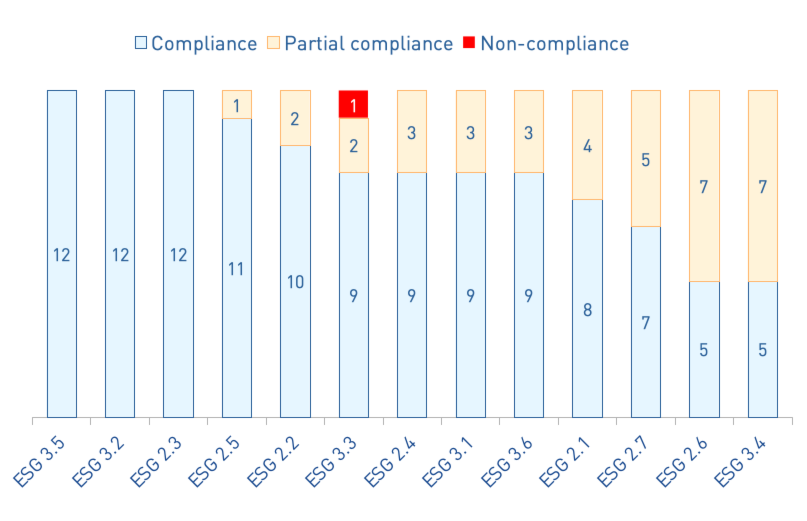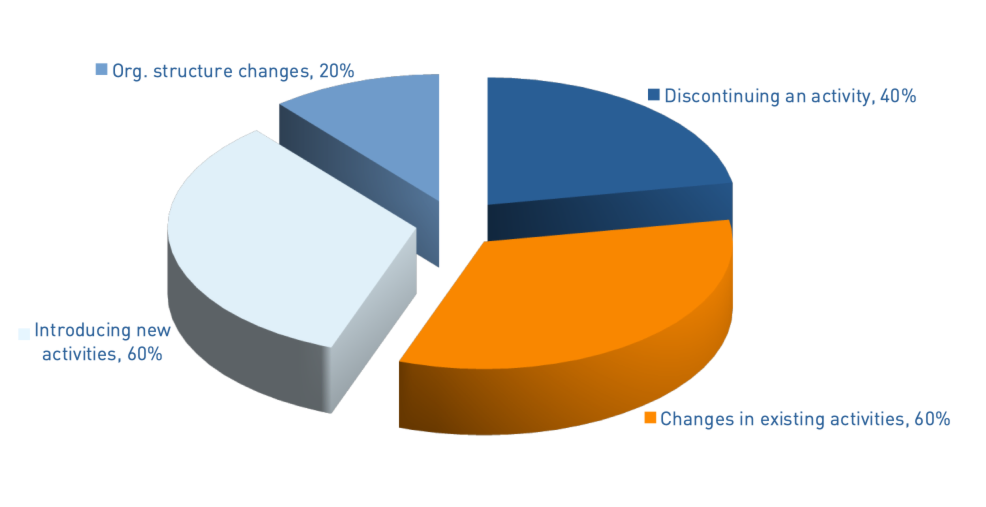Managing the Register
EHEA Key Commitment
In 2020, there were no changes in the number of countries fulfilling the European Higher Education Area (EHEA) Key Commitment on quality assurance. In 28 EHEA countries (see map below) higher education institutions are subject to regular external quality assurance in line with the ESG, carried out by EQAR-registered agencies, as was the case at the end of 2019.
The lack of progress in countries fulfilling the Key Commitment may to some extent be explained by the pandemic, which led to a postponement of new applications and a stagnation in advancing new legal regulation to support external QA arrangements in line with the ESG.
EQAR continued to contribute to initiatives aimed at supporting countries in that regard, as part of the EHEA Thematic Peer Groups and by feeding expertise into the ENQA-led SEQA-ESG project, see the chapter Contribution to the Development of the EHEA below.
Map Legend
Green: A fully functioning quality assurance system is in operation nationwide, in which all higher education institutions are subject to regular external quality assurance by an agency that has successfully demonstrated compliance with the Standards and Guidelines for Quality Assurance in the EHEA (ESG) through registration on EQAR
Yellow: A fully functioning quality assurance system is in operation nationwide but only some higher education institutions are subject to regular external quality assurance by an agency that has successfully demonstrated compliance with the ESG through registration on EQAR
Orange: A quality assurance system is in operation nationwide, but has not (yet) been fully aligned to the ESG
Red: No quality assurance system is in operation
Decisions on Inclusion and Renewal of Registration
Initial Applications for Inclusion
At the end of the year, 48 quality assurance agencies were listed on the Register. In 2020, no agencies were newly admitted to the Register, even though three applications for initial inclusion were considered. Of these three, two were rejected and one was deferred pending additional representation, with a final decision expected in 2021. Both rejected QA agencies have subsequently initiated a focused review against the ESG, to address those issues that led to their rejection. They are expected to re-apply in 2021/2022.
The number of initial applications represents a small decrease compared to previous years, with usually ca. 5-6 new applications each year.
Further new applications are expected for the next years, as the Register Committee already confirmed eligibility for four initial applications in 2019 and 2020. These agencies’ reviews started in 2020 and will conclude in 2021 and 2022.
Applications for Renewal of Registration
Of the ten applications for renewal of registration considered in 2020, the Register Committee approved nine and rejected one. Five of the successful agencies had to go through an additional representation first, before the Committee was able to conclude that they remain substantially compliant with the ESG.
With the completion of these renewal applications, all EQAR-registered agencies have now been successfully reviewed against the ESG 2015. A list of all final decisions taken in 2020 (as well as earlier years) is available here.
Compared to the previous years, EQAR recorded a small drop in the applications for renewal of registration (from 12 to 10). This was mainly due to the fact that many reviews and applications were postponed in 2015/16 as part of the transitional arrangements to the ESG 2015.
| Initial Applications | 3 |
|---|---|
| Approved | 0 |
| Withdrawn | 0 |
| Rejected | 2 |
| Pending | 1 |
| Appeals | 1 |
| Successful | 0 |
| Unsuccessful | 1 |
| Renewal Applications | 10 |
| Approved | 9 |
| Withdrawn | 0 |
| Pending | 0 |
| Rejected | 1 |
| Appeals | 1 |
| Successful | 0 |
| Unsuccessful | 1 |
| Registration ended/expired | 0 |
The full decisions can be consulted here.
Appeals
In 2020, the Appeals Committee considered three appeals against Register Committee decisions.
One appeal sought to reverse the Register Committee’s holistic judgment of not substantial compliance with the ESG. Another appeal sought to overturn the Committee’s judgement per one standard, although the holistic judgment on its application was positive. A third appeal concerned the Register Committee’s decision to reject an application due to the ineligibility of the chosen review coordinator.
In all three cases the Appeals Committee upheld the Register Committee’s initial decision, as the appeals were formally admissible, but not substantiated.


COVID-19 consequences
The COVID-19 pandemic has had an impact on the daily work of registered agencies, who have been challenged to continue their operations under “lock-down conditions”.
To answer possible concerns and questions about registered agencies’ operations, at the beginning of the pandemic EQAR prepared a note on a dedicated page, which was communicated to all registered agencies. In particular, EQAR announced the possibility for flexible arrangements for agency review schedules and clarified a number of matters regarding some specific ESG requirements i.e. organising reviews online instead of on site, moving meetings, trainings and other activities online, prolonging or delaying accreditation periods etc.
Monitoring of Registered Agencies
The Register Committee considered 10 substantive change reports in 2020.
The Register Committee took note of the information provided in eight of the change reports and asked for a further report in two cases.
All reports included changes in the agency’s external quality assurance activities, from initiating new activities (60%), to introducing changes to existing activities (60%) to discontinuing existing activities (40%). These changes illustrate that many agencies have adapted or expanded their range of external quality assurance activities.
In some cases, these changes came as a direct result of the new legal frameworks or regulations in countries where the agencies operate (i.e. Lithuania, United Kingdom) or as a result of widening their offer of external QA activities within the country of operation (Switzerland, Spain). In some cases new innovative approaches to external QA activities were developed as result of the agencies own exploration and desire to reduce fatigue in external QA reviews (ASIIN, FINEEC, HAC, IAAR, SKVC).
Other aspects addressed in change reports concerned changes to the organisational structure of the agency, i.e. establishment of new subcommittees or supervisory committee as well as internal changes in the leadership and staff of the agency.
In 2020, EQAR received one third-party complaint on the work of a registered agency. The Register Committee considered the complaint, but concluded that it was unsubstantiated. In line with the EQAR Complaints Policy, the decision was published in anonymised form.

Updates in the work of the Register Committee
Since mid-2020, EQAR has moved from a separate confirmation of eligibility to a confirmation of tripartite Terms of Reference. This approach simplified the eligibility process. EQAR approves the draft Terms of Reference for the review and requests changes/additions where needed. The document is afterwards submitted back to the applicant agency and review coordinator.
For those cases where agencies choose to work with another review coordinator than ENQA, the Register Committee has adopted a specific policy on the Eligibility of Review Coordinators and Panels. The document specifies the Committee’s expectations in terms of the review coordinator’s independence and professional capacity.
In 2020, EQAR published a new version of its Guide for Agencies as a web-based document, allowing easy updating and navigation through its chapters.